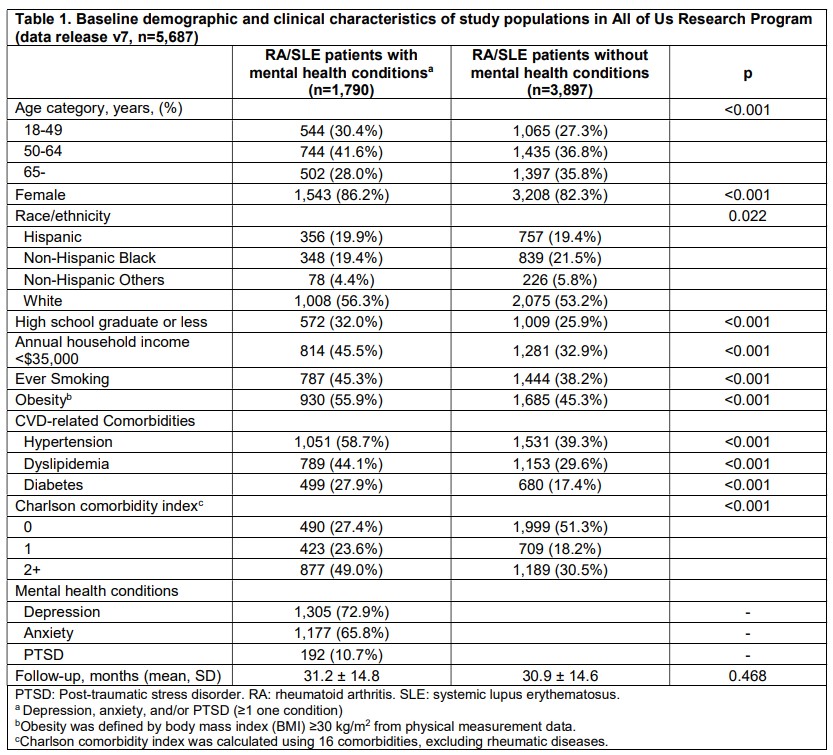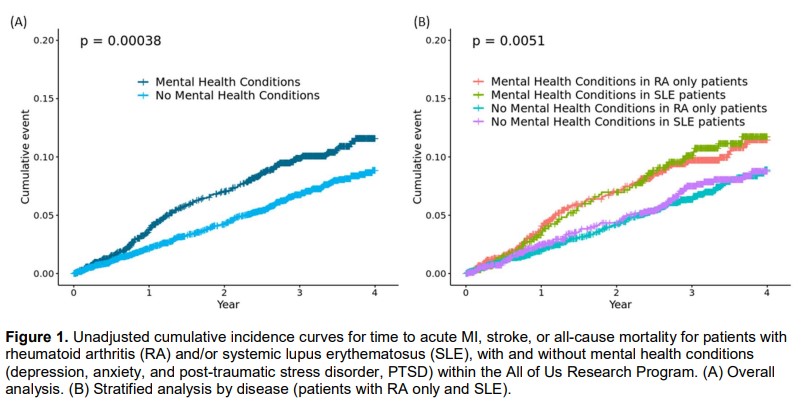Session Information
Session Type: Poster Session A
Session Time: 9:00AM-11:00AM
Background/Purpose: Cardiovascular disease (CVD) risk is increased for patients with rheumatoid arthritis (RA) and systemic lupus erythematosus (SLE). Mental health conditions such as depression, anxiety, and post-traumatic stress disorder (PTSD) are not traditional CVD risk factors but have been associated with CVD risk and are highly prevalent in SLE and RA populations. We assessed the contribution of these 3 mental health conditions related to stress and emotional distress to CVD risk among patients with RA and/or SLE in a large, diverse U.S. cohort.
Methods: We used data from the All of Us Research Program (v7), a NIH cohort with >287,000 adult participants in the U.S. who gave consent for linkage to their electronic health records. RA/SLE patients were identified by ≥2 ICD-9, ICD-10, or SNOMED codes >2 months apart within 2 years of enrollment. We excluded patients with acute myocardial infarction (MI) and stroke at baseline (1 year pre-enrollment). Depression, anxiety, and PTSD were identified by ICD-9/10, and SNOMED codes in the baseline period. The primary outcome was a composite of acute MI, stroke (identified by ICD9/10 and SNOMED codes), and all-cause mortality. Patients were followed until the 1st acute MI, stroke, or death, through 4 years or end of study period (July 1, 2022). Covariates included age, sex, and race/ethnicity, income, educational level, smoking, obesity, and comorbidities. We estimated incidence rates (IRs) and incidence rate ratios (IRRs). Adjusted Cox regression models compared risks of the endpoint of acute MI, stroke, or all-cause mortality among RA/SLE patients with and without these 3 mental health conditions.
Results: We studied 3,825 patients with RA only, 1,862 with SLE (including 383 with meeting both definitions). Among them,1,790 (31.5%) had depression, anxiety, and/or PTSD (Table 1). Compared to patients without, those with ≥1 mental health conditions were more likely to be less educated, in a low-income group, to have ever smoked, to be obese, and to have comorbidities. Patients were followed for a mean of 31.0 months (SD 14.7). 155 events (64 MI, 55 strokes and 36 deaths) occurred among RA/SLE patients with mental health conditions in 55,856 person-months (IR 33.3/1000 person-years) vs. 232 (75 MI, 117 strokes and 40 deaths) among those without mental health diagnoses in 120,422 person-months (IR 23.1/1000 person-years; IRR 1.44). The risk of acute MI, stroke, and death was significantly higher among patients with these mental health conditions than without for both RA and SLE (Figure 1). After adjustment for smoking, obesity, and Charlson comorbidity index, the HR of incidence of MI, stroke, or all-cause mortality for patients with concomitant mental health conditions was 1.28 (95% CI 1.02-1.60, Table 2).
Conclusion: In this large diverse U.S. cohort of patients with RA/SLE without prior CVD events, depression, anxiety and PTSD were associated with increased risk of developing acute MI, stroke, or death. These results suggest greater awareness of increased CVD risk among rheumatic disease patients with concurrent mental health conditions is needed. Research is ongoing to dissect the likely multifactorial causal pathways underlying this relationship.
To cite this abstract in AMA style:
Yee J, Oakes E, Choi M, Feldman C, Karlson E, Costenbader K. Depression, Anxiety and Post-Traumatic Stress Disorder in Association with Cardiovascular Disease Among Patients with Systemic Lupus Erythematosus and Rheumatoid Arthritis in the All of Us Research Program [abstract]. Arthritis Rheumatol. 2023; 75 (suppl 9). https://acrabstracts.org/abstract/depression-anxiety-and-post-traumatic-stress-disorder-in-association-with-cardiovascular-disease-among-patients-with-systemic-lupus-erythematosus-and-rheumatoid-arthritis-in-the-all-of-us-research-pr/. Accessed .« Back to ACR Convergence 2023
ACR Meeting Abstracts - https://acrabstracts.org/abstract/depression-anxiety-and-post-traumatic-stress-disorder-in-association-with-cardiovascular-disease-among-patients-with-systemic-lupus-erythematosus-and-rheumatoid-arthritis-in-the-all-of-us-research-pr/



